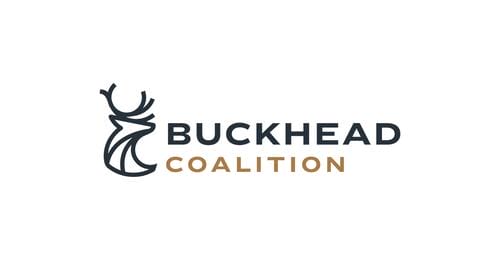
The Buckhead Coalition has unveiled a new mission statement and initiatives tackling public safety, homelessness and 2021 election information.
The major rebranding and reorientation for the over 30-year-old nonprofit group of elite corporate and civic leaders also includes a launch of a social media presence. The remake follows the Coalition’s first-ever leadership change last year, when former Atlanta Mayor Sam Massell announced his retirement from the president role.
The new president and CEO is Jim Durrett. He’s also the longtime executive director of the Buckhead Community Improvement District, a self-taxing group of commercial property owners in the central business area. Under Durrett, the quasi-public CID and the private Coalition are sharing some staff members, and also working closely with partner groups the Buckhead Business Association and the environmentally oriented Livable Buckhead.
“Our membership is focused on three key initiatives impacting the residents of Buckhead and the greater Atlanta community as a whole: public safety, homelessness, and get-out-the-vote efforts as a member of the Committee for Better Atlanta,” said Durrett in a press release. “The election this November is the most consequential one for our city in my memory. Our new brand, website, and digital capabilities will further enhance the Coalition’s ability to draw attention to these key areas and ultimately mobilize positive community action.”
Durrett told Buckhead.com that the Coalition also plans to “continue and even enhance” two of its annual signature events: a “State of the Neighborhood” address and a January luncheon featuring a prominent newsmaker-type speaker, which in recent years has included the newly elected governor and mayor.
Founded in 1988, the Coalition is an invitation-only group of dues-paying members (plus some ex-officio members of other groups) currently numbering around 125. CNN founder Ted Turner is on the rolls, as are the chairmen or CEOs of such powerful institutions as UPS, Waffle House, Piedmont Healthcare and virtually every major development company in the area. Local luminaries on the membership list include Alana Shepherd, co-founder and chairman of the Shepherd Center rehabilition hospital; Atlanta History Center president and CEO Sheffield Hale; Rev. Sam Candler, dean of the Episcopal Cathedral of St. Philip; David Cummings, CEO of Atlanta Tech Village; and Aaron’s Inc. founder Charlie Loudermilk and his son Robin, the head of the Loudermilk Companies. The current chairman is Dave Stockert, former president and CEO of Post Properties and now a Buckhead real estate investor.
The identity of members was long semi-private, with the list available on request; a significant change amid the digital rebranding is listing everyone on the Coalition’s rebuilt website.
Massell led the Coalition from its founding as something akin to a tourism bureau and economic development department. Besides the annual event, the Coalition published an annual “Buckhead Guidebook” full of facts and figures about the neighborhood, its businesses and its demographics. In its early years, the Coalition played a significant role in such major initiatives as the creation of the CID and the highly controversial construction of the Ga. 400 highway through the neighborhood. Donations of money and first aid items to local organizations and businesses was another longtime practice.
Under Massell, the Coalition also engaged in sometimes whimsical local boosterism that treated the neighborhood something like an imaginary kingdom. Massell convinced the General Assembly to approve unofficial Buckhead boundaries, commissioned a neighborhood flag, and in a piece of business left unfinished with last year’s retirement, stumped for the area to be branded as an unofficial “township.”
Such local exceptionalism shared the flavor of occasional rumblings for Buckhead to leave Atlanta and become its own city, which Massell always opposed and suggested was an appetite his unofficial brandings should satisfy.

When Durrett took over last year, he and the Coalition’s executive committee launched an effort to develop a new strategy for the nonprofit. But opposing a new and uniquely powerful Buckhead cityhood movement was an immediate goal as well, one that the Coalition, the CID and its partner organizations have joined. With Durrett’s joint leadership, the Coalition and the CID also worked closely as partners on the “Buckhead Security Plan,” a privately developed attempt to boost a bevy of local crime-fighting efforts.
Public safety remains among the Coalition’s new short-term key initiatives. The part about tackling homelessness largely relates to working with such groups as Buckhead Christian Ministry and Partners for HOME, which the CID also has done. On the municipal elections, the Coalition has posted candidate questionnaires on local issues and general election information. The Coalition is also a member of the Committee for a Better Atlanta, another group of civic and business leaders that has hosted candidate forums and issued a “scorecard” of who it considers worthy of public office.
The Coalition’s new vision statement reads: “The Buckhead Coalition’s vision is for Buckhead to be the most vibrant, welcoming, and safe intown community in America for residents, businesses and visitors, and an indispensable contributor to the economic vitality and cultural dynamism of Atlanta.”
And the new mission statement says: “The Buckhead Coalition’s mission is to advocate on behalf of the community within the city of Atlanta and metropolitan region; to support the well-being of Buckhead’s residents, businesses and visitors; to convene public and private sector leaders and partner organizations; and to connect Buckhead to other areas of the city and region.”